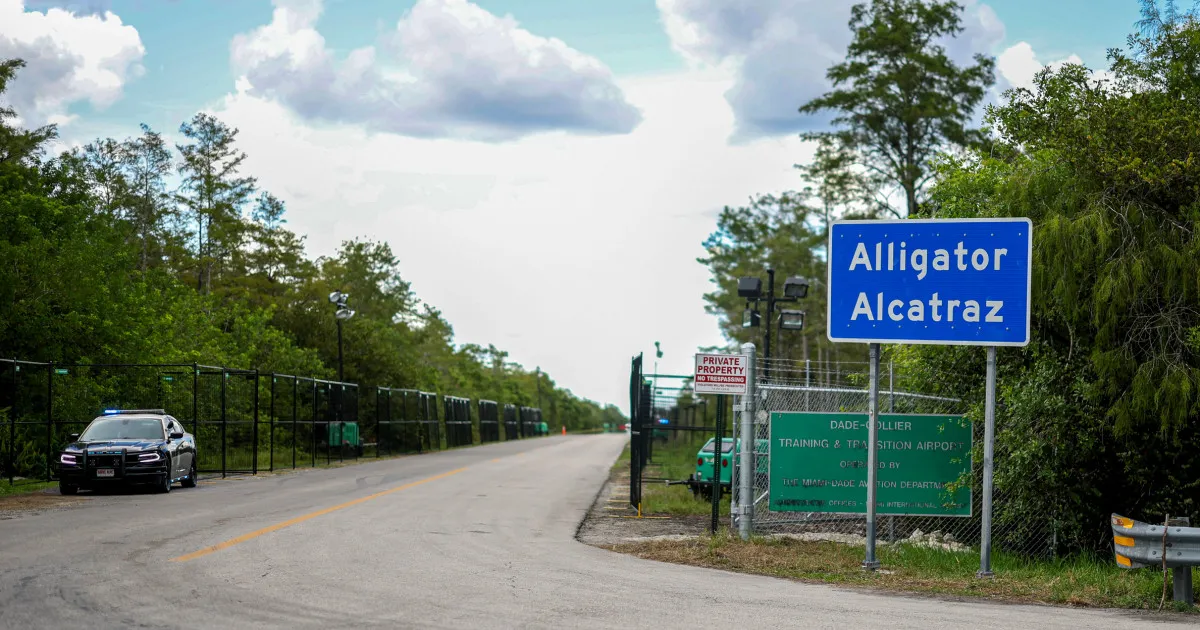
In a significant ruling on Thursday, a federal judge in Miami determined that the controversial migrant detention facility known as Alligator Alcatraz, located in the Florida Everglades, can continue its operations temporarily. However, U.S. District Judge Kathleen M. Williams has placed strict limitations on the facility, prohibiting any expansion and preventing the intake of new detainees. This ruling comes as part of an ongoing legal battle that centers around environmental concerns and compliance with the National Environmental Policy Act.
Judge Williams issued a preliminary injunction aimed at preventing further industrial developments at the site, specifically halting the installation of new lighting and any expansions of the facility. The ruling explicitly states that no additional individuals can be detained at the site beyond those who were already present at the time of the order. This injunction was filed late Thursday and is a response to allegations of violations concerning environmental laws.
According to the 82-page ruling, within the next 60 days, and "once the population attrition allows for safe implementation of this Order," the facility must eliminate all generators, gas, sewage, and other waste receptacles that were established to support its operations. Additionally, all industrial lighting added to the detention facility must be removed. The issue of light pollution was a major concern during the hearings held earlier this month, raising questions about how the facility can remain operational without these essential resources.
The ruling also mandates the removal of temporary fencing that was set up to enable access for members of the Native American tribes, aligning with the access previously granted before the detention facility was built. Following the judge's ruling, the defense team has filed an appeal, although neither the Department of Justice nor the Department of Homeland Security has provided immediate comments on the matter. Requests for comments from the offices of Florida Governor Ron DeSantis and the Florida Division of Emergency Management also went unanswered.
Environmental groups that initiated the lawsuit against the detention center are celebrating the ruling as a "major victory" for the delicate ecosystems of Florida. They argue that the facility poses a significant threat to the Everglades ecosystem, which is home to numerous endangered species and vital water resources. "Today's decision means the facility must wind down operations in an orderly fashion within 60 days," they stated, emphasizing the ecological importance of the region.
The lawsuit filed in June pointed out that the Alligator Alcatraz facility commenced operations in July without adhering to the ecological reviews mandated by the National Environmental Policy Act. Environmental advocates argue that the construction violated various state and federal laws, including the Endangered Species Act. The Trump administration previously dismissed these environmental concerns, asserting that the facility was essential to meet public demand for stricter immigration policies.
Leaders from the Miccosukee Tribe of Indians of Florida have voiced their support for the ruling, emphasizing their ongoing commitment to safeguarding their ancestral lands in the Big Cypress area. Tribal Chairman Talbert Cypress reiterated the tribe's historical fight for their rights, stating, "When it comes to our homeland, there is no compromise." The tribe's representatives highlighted the lack of consultation from federal and state authorities regarding the site's construction.
Environmental advocates and tribal members have raised alarms over the impact of the detention facility on the unique ecosystem of the Everglades, which supports various endangered species. The construction and operation of the facility have led to increased activity in the previously quiet region, resulting in concerns about wildlife displacement and the loss of medicinal plants critical to the tribe's cultural practices.
As the legal proceedings continue, the future of the Alligator Alcatraz detention facility remains uncertain, with environmental and tribal advocates determined to ensure that the government upholds its legal obligations to protect these vital natural resources.